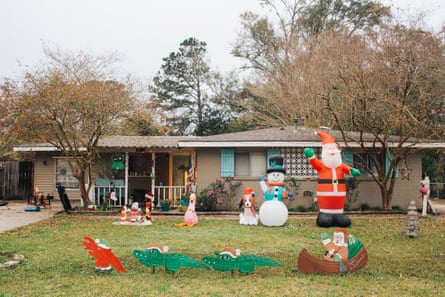Being a funeral home director in Zachary, Louisiana, means sometimes your neighbor calls when they see cars in the parking lot, to ask: “Who died?”
Zachary, a suburb of Baton Rouge, has a population of about 18,000.
George Joseph “GJ” Charlet III and his three siblings own one of the two funeral homes in Zachary. During the coronavirus pandemic, they have found their business – like many other small-town funeral homes across America – has witnessed the unfolding of the disaster up close and personal.
The business has been in the Charlet family since their grandfather and his brother opened it in the 1940s. Charlet is one of three funeral directors at the Charlet family funeral home. He grew up 20 miles north of Zachary behind another funeral home that his family owns in Clinton, Louisiana, which was damaged in the historic floods of August 2016.
Because he was raised in a funeral home, Charlet knows how to prepare for the worst. He was taught at a young age to fill up the gas tank on the hearse before the local high school prom, in case there were deaths resulting from drunk-driving accidents.
But even Charlet wasn’t prepared for the Covid-19 pandemic. “The first couple of months, it was really scary because there wasn’t a lot of guidance on what we were supposed to do,” he said. A short supply of body bags meant some bodies had to be wrapped in sheets.


That worried Charlet because he was unsure about the risk of catching Covid-19 from a dead body. Charlet and other members of the staff went above and beyond to try to protect themselves by wearing surgical gowns everywhere they went. The Centers for Disease Control and Prevention has since said that the risk of being infected from a dead body is low, because they do not exhale.
In the beginning, the Charlet funeral home did not allow services inside and only held graveside funerals, which they tried to limit to 10 people. But getting mourning family members to follow the rules wasn’t easy.
“Without fail, people just, you know … they did what they wanted to do,” he said. “There was no way for us to keep people away from funerals.”
The funeral home now allows indoor services of 75 people or fewer. Charlet worries about catching the virus from a funeral attendee who may have been in close contact with the deceased before their death.
“It’s rare that we have a funeral service where we don’t know somebody in the family or have some connection to them. It’s a very social atmosphere,” he said. “These days, I let folks in the building and then I go back to my office and I close the door. And I try my hardest not to interact with people as much as I used to.”


There have been 552 Covid deaths in East Baton Rouge parish, where Zachary is located, according to Louisiana department of health data. The parish has had an average positivity rate of 10% over the past six weeks. Over the same time period, an average of 13% of those tested for Covid-19 in the two census tracts that make up Zachary were positive for it.
There have been more deaths in the community because of Covid, but it hasn’t overwhelmed the funeral home, Charlet said. Normally they handle about five services per week. But since Thanksgiving the number of Covid deaths has increased, he said. The funeral home performs services for some of the deaths at the Louisiana state penitentiary in Angola. There have been 16 prisoner deaths from Covid-19 at the prison.
Charlet has a printout of an essay called Always Go to the Funeral by Deirdre Sullivan in a folder of clippings he wants read at his funeral. “Humans kind of need that ritual of saying goodbye,” he said. “You have to acknowledge someone’s death.”
But his 80-year-old uncle recently caught Covid and is very sick. If he dies, Charlet doesn’t want his mother to go to the funeral. “I just kind of wish people used more caution and took advantage of writing a condolence letter,” he said. “It’s a weird place for me to be. It’s counterintuitive to my livelihood.”
